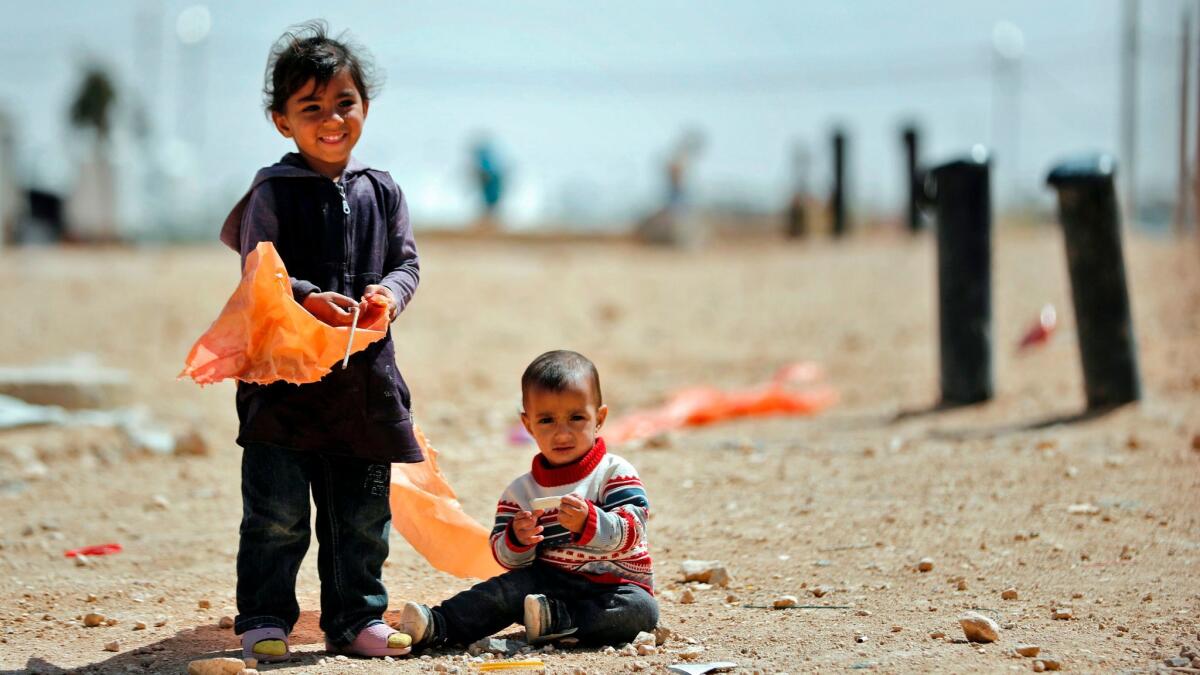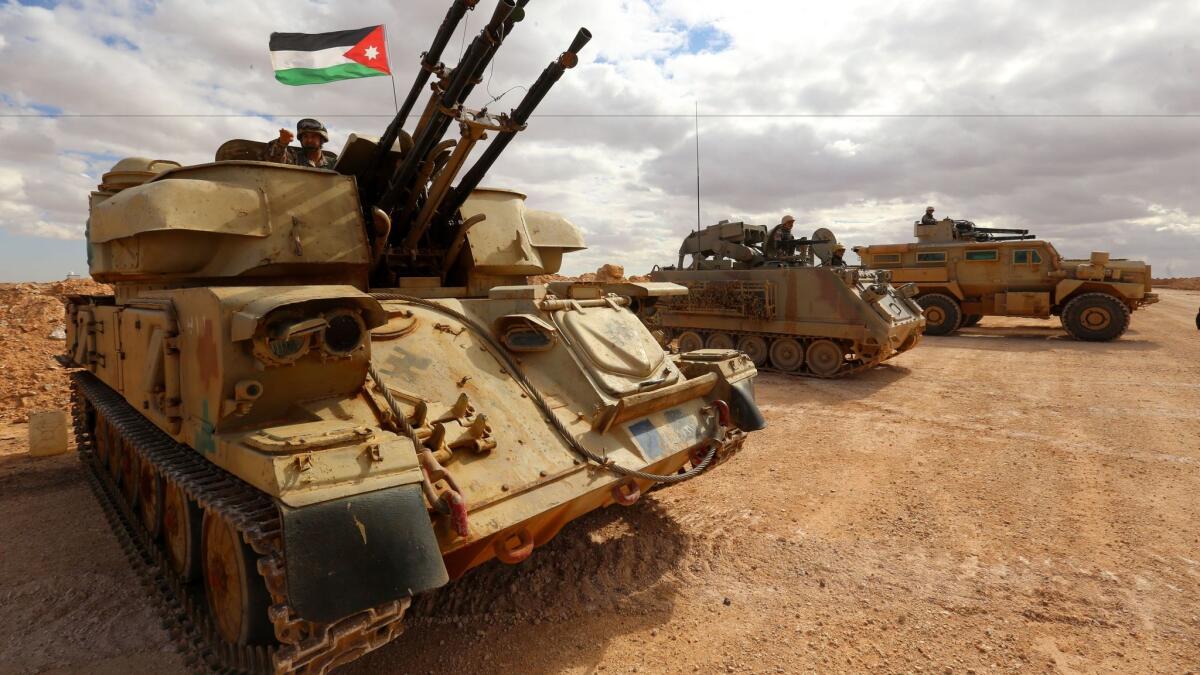How long can Jordan keep walking the Middle East tightrope?
- Share via
Reporting from Amman, Jordan — For six tumultuous years, Jordan has weathered the war in neighboring Syria by walking a fine line: supporting the U.S.-supported rebels seeking to overthrow President Bashar Assad, but also cooperating with Assad’s closest ally, Russia.
But as the Trump administration pursues a more muscular stance toward both Assad and Islamic State militants, it threatens to upend Amman’s tightrope act at a time when the Islamist threat against the kingdom has never been greater.
In the last few months, as Islamic State has lost ground near its self-proclaimed capital cities of Mosul, Iraq, and Raqqah, Syria, a new offensive has been launched by rebel forces, trained in and equipped in Jordan with U.S. help. The operation has begun to clear the jihadists from the Hamad Desert, territory that includes Syria’s southeastern corner.
As the jihadists face more pressure in Mosul and Raqqah, many fear the Islamists will forge a path to the Hamad. A longtime smuggling route, it has become a vital supply line for Islamic State, said Tlass Salama, commander of the Jaish Usood al Sharqiya, or the Lions of the East Army.
Salama said rebels there have fought as comrades in arms with members of U.S. and Norwegian special forces to repel Islamic State attacks at the desolate garrison in Tanf, a one-time agricultural facility roughly 10 miles from the Jordanian border that has been converted into a base. These opposition factions, said the coalition in a statement this month, “have been instrumental in countering the ISIS threat in southern Syria and maintaining security along the Syria-Jordan border.”
Working with other U.S.-supported rebel factions, Salama said his 1,300-man group has already clawed back hundreds of miles from Islamic State stretching toward the central desert province of Homs.
Reports have also emerged of Jordanian and U.S. troops on the section of the Jordanian border opposite southwest Syria, a possible prelude to a campaign in which rebels, supported by Jordanian and coalition forces on the ground, would overrun Islamic State’s pocket in the Yarmouk basin, near southwestern Syria’s borders with Israel and Jordan.

The news kicked up a war of words with Jordan, Russia and Syria.
Russian Foreign Minister Sergei Lavrov this month asked for clarification from Amman. Less than a week later, Assad, in an interview with the Russian Segodnya news agency, criticized Jordan as “part of the American plan since the beginning of the war in Syria.”
Assad said Jordan was acting at the behest of the Trump administration.
“Jordan is not an independent country anyway, whatever the American wants, it will happen, so if the Americans want to use the northern part of Jordan against Syria, they’re going to use it,” Assad said, according to a transcript released by Syrian state news operator SANA.
“We don’t discuss Jordan as a state; we discuss Jordan as land in that case, because it’s the United States who defines the plans, who defines the players, and who endorses everything regarding Syria coming from Jordan.”
Jordan rejected Assad’s remarks as “fabricated allegations,” according a statement by Jordanian government spokesman Mohammad Momani. He added that Jordan had long reiterated the importance of preserving the territorial unity of Syria and fighting terrorist organizations.
The increased tension comes after a period of cautious recalibration between the two countries. Amman, activists say, had over the last two years largely scaled back support for anti-Assad rebels and stopped them from launching attacks on Assad’s forces in Syria’s southern provinces, which abut Jordan.
In November, Lt. Gen. Mahmoud Freihat, Jordan’s top military commander, said in an interview in with the Arabic-language arm of the BBC that “since the beginning of the crisis, we never operated against the regime at all, our relations with the regime have remained, and our diplomatic relations with Syria have also remained.”
He acknowledged that Jordan has trained rebel groups, but, he insisted, the rebels were tasked with defending Jordan’s borders from Islamic State and fighting the group in the Hamad Desert.
But Jordan’s change of tone in recent weeks, which comes on the heels of a recent White House visit by the Jordanian monarch, King Abdullah II, is a reflection of the shift in U.S. policy, said Oraib Rintawi, head of the Al Quds Center think tank, which is based in Amman.
“Jordan cannot veer far from U.S. policy [on Syria] in this regard,” Rintawi said. He explained that although the U.S. has made fighting Islamic State a priority, a closer look at the policies of the U.S. shows “that the restriction of Iran takes a higher priority on the U.S. agenda.” One lingering question is what role Jordan might play in U.S. policy with Iran.
Rintawi pointed to recent statements by Abdullah against Iran. In an interview with the Washington Post this month, Abdullah warned that Iran was trying to “forge a geographic link” from Tehran to Beirut via Syria’s eastern desert once Islamic State was removed. The U.S., Rintawi said, was instead trying to fill the expected vacuum with forces friendly to the U.S.
Jordan’s increased involvement has also been noted by Islamic State. In early April, the group issued a 21-minute video vowing to conduct attacks in the country. The threats were delivered by five Jordanian members of Islamic State, all from prominent tribal families that are thought to be loyal to Jordan.

“We must hurt this arrogant regime and make it taste some of the flames of war tasted by those it had trained in Jordan,” says Qutaibah Majali, a shaggy-haired jihadist who left Jordan more than three years ago to join Islamic State in Raqqah.
Later, the scene shifts to Majali brandishing a knife.
“Our knives will get your necks and that of every Crusader in Jordan. And our bullets will bore your rotten heads, so receive good tidings of that which hurts you,” he says before kicking down a prisoner, said to be a spy recruited by Jordanian intelligence, and slicing through his neck.
But Rintawi, the analyst, said his main fear was not Islamic State, but what’s left in its aftermath. Would Syrian pro-government forces allow rebels supported by Jordan to hold ground they had taken from the extremist group? How would Jordan react when Syrian forces and the rebels clash once Islamic State is out of the picture?
Complicating the situation further is the presence of Iran’s Revolutionary Guard, which is stationed in Syria less than 50 miles from the Jordanian border.
“U.S. policy is set for a grand confrontation with Iran. We’re going to have a four- and five-year confrontation where the Americans don’t pay, but we do,” Rintawi said. “They fight now using Syrians, Yemenis, and others. I hope it won’t be with us as well.”
Bulos is a special correspondent.
ALSO
Pope Francis leaves Egypt after high-stakes, two-day visit
‘Even the stones reek with sadness’: Here is what’s left of Aleppo
Across the Middle East, Christians are heading for the exits
More to Read
Sign up for Essential California
The most important California stories and recommendations in your inbox every morning.
You may occasionally receive promotional content from the Los Angeles Times.










